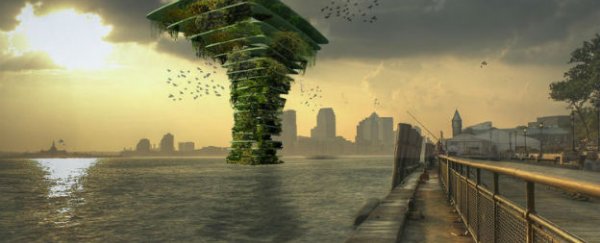Let's face it - we're doing a horrible job at coexisting with wildlife. Just a few months ago it was reported that populations of mammals, birds, reptiles, amphibians and fish have declined by an average of 52 percent over the past 40 years, with freshwater species down by a staggering 76 percent.
Our cities are becoming more and more uninhabitable for the species that inhabited the land long before us, as development pushes them farther and farther out into rapidly reducing forests and woodlands. It's even thought to be the reason diseases such as Nipah, Hendra, Ebola, Marburg, and SARS spread from wild bats to farm animals to us.
So Koen Olthius, founder of Netherlands-based city planning and architectural firm, Waterstudio, has come up with a way that we can give back some of the city back to the wildlife that can't afford to leave. According to Adele Peters at Fast Company, the design of the so-called 'Sea Trees' is based on floating oil platforms - large, shelved structures that sit in the ocean for storage.
Each level of the tree-shaped platforms would support a different type of habitat, right down to a coral reef at the bottom, if the climate permits. Birds could come and go as they please, and build nests away from people, traps, and roads.
"We took park zones in urban areas, we divided this in pieces, and put them vertically on top of each other. In the end, it became a vertical hangout for wildlife," Olthius told Peters. "Our inspiration came from a project in Holland where ecologists forced us to provide habitats for animals that couldn't be disturbed by people. Water is, of course, a perfect way to keep people away."
Olthius says that waterways make up almost 90 percent of the space occupied by the world's largest cities. "Our favourite locations would be Mumbai or New York," he added. "Both have such a high price on land that it makes the construction of new park zones on land not feasible."
Peters says that this design isn't just a fun concept to fill out the firm's portfolio - Waterstudio is ready to start building as soon as possible. They're hoping to work with oil companies to refine their designs based on existing oil platforms, seeing as the technology is already proven, and widely used.
"The technology of oil companies is a proven one," he told Fast Company. "Of course we can design a foundation ourselves, and we will improve the existing design. But this takes time. Taking the existing technology provides a chance to act fast at this moment."
Maybe it'll never happen, but we love it when experts put their minds to figuring out new ways to mitigate the damage we're doing to city wildlife. Cities aren't going anywhere any time soon, so ideas like this are going to become increasingly important.
Waterstudio aren't strangers to big ideas. Ealier this year, they were given approval to construct a floating luxury hotel near Tromsø in Norway so guests can watch the Northern lights from their beds.
 Waterstudio's Krystall Hotel
Waterstudio's Krystall Hotel
Source: Fast Company
